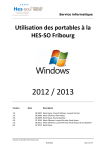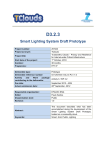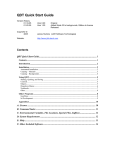Download Parallel Object Programming in C++ Getting Started
Transcript
Parallel Object Programming in C++ Getting Started The POP-C++ Team Grid & Cloud Computing Group Institute of Complex Systems http://gridgroup.hefr.ch [email protected] Software Version : 2.5 Manual Version : 2.5-b Parallel Object Programming with C++ Getting Started Parallel Object Programming in C++ Manual version : 2.5-b, July 2014 Software Version : 2.5 Copyright(c) 2005-2014 Grid and Cloud Computing Group University of Applied Science of Western Switzerland, Fribourg Boulevard de Pérolles 80, CP 32 CH-1705 Fribourg, Switzerland. http://gridgroup.hefr.ch Permission is granted to copy, distribute or modify this document under the terms of the GNU Free Documentation License published by the Free Software Foundation. POP-C++ is free software, it can be redistributed or modified under the terms of the GNU Lesser General Public License(LGPL) as published by the Free Software Foundation. It is distributed in the hope that it will be useful, but without any warranty. See the GNU General Public License for more details (LGPLv3). This work was partially funded by the CoreGRID Network of Excellence, in the European Commission's 6th Framework Program and by the University of Applied Sciences of Western Switzerland of Fribourg. The POP-C++ Team : Pierre Kuonen Tuan Anh Nguyen Jean-François Roche Valentin Clément David Zanella Marcelo Pasin Laurent Winkler Nicolas Brasey Problems or questions concerning POP-C++ can be submitted on the POP-C++ web site or be sent by e-mail to: [email protected] Table of content Chapter 1: Download POP-C++ ......................................................................1 1.1 Introduction to POP-C++ ................................................................................................1 1.2 Latest stable version ......................................................................................................1 1.3 Previous stable versions ................................................................................................2 Chapter 2: POP-C++ Installation .....................................................................3 2.1 Introduction ....................................................................................................................3 2.2 Before the installation .....................................................................................................3 2.2.1 Requirements........................................................................................................................3 2.3 Installation ......................................................................................................................4 2.3.1 Compiling .............................................................................................................................4 2.3.2 Installation script ...................................................................................................................4 2.4 Environment ...................................................................................................................6 2.4.1 PATH.....................................................................................................................................6 2.5 Test .................................................................................................................................6 Chapter 3: Introduction to programming in POP-C++ ..................................7 3.1 Introduction ....................................................................................................................7 3.2 Files ................................................................................................................................7 3.2.1 MyParClass.ph .....................................................................................................................7 3.2.2 MyParClass.cc .....................................................................................................................8 3.2.3 main.c ...................................................................................................................................9 3.3 Compilation ....................................................................................................................9 3.3.1 The compilation process in POP-C++ ..................................................................................9 3.1.2 The Map file ........................................................................................................................10 3.4 Running the program....................................................................................................10 Download POP-C++ 1 CHAPTER 1 Download POP-C++ 1.1 Introduction to POP-C++ 1.2 Latest stable version 1.3 Previous stable versions 1.1 Introduction to POP-C++ POP-C++ is a comprehensive object-oriented framework for developing efficient distributed applications in large distributed computing infrastructures such as Clusters, Grid, P2P or Clouds. It consists of a programming suite (language, compiler) and a run-time system. The POP-C++ language is a minimal extension of the C++ programming language, that implements the parallel object model. The extension has been kept minimal in order to make the POP-C++ language as close as possible to C++, to ease learning of POP-C++ and to make existing C++ libraries and programs easy to port in POP-C++. POP-C++ is developed and maintained by the Grid & Cloud Computing Group of the University of Applied Science of Western Switzerland at Fribourg. 1.2 Latest stable version The latest stable release of POP-C++ is version 2.5 (released in October 2012). We strongly recommend to use this version. There exists two versions of POP-C++ software, one for Linux systems (Ubuntu, Fedora, etc) and one for MacOS systems. Download the version which is appropriated to your owns system here: • http://gridgroup.hefr.ch/popc/doku.php/download Important (If you have already installed an older version of POP-C++) : • Note that the names of all global variables could have changed from PAROC_… to POPC_… and the names of scripts from paroc_… to popc_… • • • You need to regenerate your object.map files since the architecture notation has changed. You must recompile all your POP-C++ programs with the version 2.5. Do not forget to stop (or kill) the Job Manager and then to restart it after having finished the installation of the last version of POP-C++ (See section 2.5 of this manual). 2 Download POP-C++ 1.3 Previous stable versions The previous stable releases of POP-C++ are versions 2.0, 1.3, 1.1.1, 1.1 and 1.0. They are now outdated and we strongly recommend to update to the new version. There also exists a “Cygwin version” to be able to run POP-C++ on Windows systems using Cygwin. This release is based on version 1.1.1 and is not maintained anymore. Demo programs A set of demo programs is available with the sources of POP-C++. You can find very simple examples on how to program in POP-C++ in examples/ and more advanced demos in the demos/ directory. POP-C++ Installation 3 CHAPTER 2 POP-C++ Installation 2.1 Introduction 2.2 Before the installation 2.3 Installation 2.4 Environment 2.5 Test 2.1 Introduction This tutorial explains how to install POP-C++ and compile a first program. For a more advanced installation, please refer to the chapter 5 of the POP-C++ user manual. If you have comments or difficulties with this installation contact the POP-C++ team at [email protected]. 2.2 Before the installation 2.2.1 Requirements POP-C++ runs on a standard Linux and on MacOS. The necessary packages are: • • • • • the g++ compiler the Gnu Tar archiver the Gnu Make utility the library zlib (development version) Other requirements (optional, only necessary if you want to modify the POP-C++ tool itself) • the Gnu Bison to regenerate the parser • Autoconf, automake and libtool to regenerate the configuration files. If you are using the apt-get utility (for example on Ubuntu), you can install zlib-devel by using the following command line: sudo apt-get install g++ zlib1g-dev If you are NOT using apt-get (such as on MacOs systems) just go to internet and look for the zlib library for your OS and install the full package. One possible link to find zlib is its home page : www.zlib.net/. 4 POP-C++ Installation 2.3 Installation 2.3.1 Compiling To compile and install POP-C++ enter the following commands. tar -xzf popc-<version>.tar.gz cd popc-<version> ./configure make make install Note • You must have full rights (read, write and execute) on the directories you compile and install POP-C++. If you experience problem when compiling POP-C++ (make command), correct the problem and, before relaunching the compilation, do make clean to force a full recompilation of the POP-C++ package. The default installation directory is /usr/local/popc, but you can change it by using: ./configure --prefix=<inst-dir> Where <inst-dir> is the full path of the directory where you want to install POP-C++. When you run make install, the installation script asks you how to setup the system. You have two options : a simple (standalone) or a standard installation. If you want to use POP-C++ only on one machine (standalone), select the simple installation. If you want to use POP-C++ on a network of machines (cluster, grid,...), you must select the standard version and parametrize POPC++ for your environment. We recommend usage of the simple version for beginners and this document only presents the simple installation. Note • You can, at anytime, switch from one installation to the other by parametrizing POP-C++. This can be done by using the popc_setup command. When you launch the installation (make install) several technical messages are displayed and eventually the following text and question are displayed POP-C++ will now be configured. To do this, some information must be entered manually. ************************************************************************** They are 2 different ways to to configure the POP-C++ Services : - if you are new to POP-C++ and simply want to try it on your machine, select a simple installation (y). No further question will be asked. POP-C++ Installation 5 - if you want to use POP-C++ on a grid using the jobmanager, or any other advanced option, select a standard installation (n). More questions will be asked. For more information about which installation suits you best please read the documentation. If needed, you can change the configuration at any time by executing '/usr/local/popc/sbin/popc_setup' or 'make install' ************************************************************************** DO YOU WANT TO MAKE A SIMPLE INSTALLATION ? (y/n) : y Answer y to this question. The following message is displayed. ===================================================== GENERATING SERVICE MAPS... CONFIGURING POP-C++ SERVICES ON YOUR LOCAL MACHINE... CONFIGURING THE RUNTIME ENVIRONMENT SETTING UP RUNTIME ENVIRONMENT VARIABLES ===================================================== CONFIGURING STARTUP SCRIPT FOR YOUR LOCAL MACHINE... ===================================================== CONFIGURATION DONE! ===================================================== IMPORTANT : Do not forget to add these lines to your .bashrc file or equivalent : --------POPC_LOCATION=/usr/local/popc export POPC_LOCATION=/usr/local/popc PATH=$PATH:$POPC_LOCATION/bin:$POPC_LOCATION/sbin Press <Return> to continue In the example shown above, we assume that you are installing POP-C++ in the default directory (i.e. /usr/local/popc) if not modify the .bashrc file (or equivalent) accordingly. 6 POP-C++ Installation 2.4 Environment 2.4.1 PATH In order to have direct access to all POP-C++ commands you must add the POP-C++ installation directory in your PATH environment variable. Add the following lines in your ~/.bashrc file (or equivalent). POPC_LOCATION=/usr/local/popc export POPC_LOCATION=/usr/local/popc PATH=$PATH:$POPC_LOCATION/bin:$POPC_LOCATION/sbin Here we assume that you have installed POP-C++ is the directory: /usr/local/popc. Note for MAC users On MacOS the name of the file equivalent to ~/.bashrc of Ubuntu is ~/.profile 2.5 Test A suite of test programs can be run to test the POP-C++ installation, but first you must launch the job manager and the resource discovery service (POP-C++ runtime services) by typing the following command: SXXpopc start You can find more information on starting and stopping the POP-C++ services in the section 5.5 of the POP-C++ User and Installation Manual. Then launch the following script : cd <popc-src>/test ./runtests -all where <popc-src> is the directory you downloaded the source of POP-C++. You also can run each test individually by typing: ./runtests --help Note • You must have full rights (read, write and execute) on the <popc-src> directory. All tests must succeed. In case of not understanding some failures on the execution of the test suite, please report the problem to the POP-C++ team by sending an e-mail at: [email protected] Introduction to programming in POP-C++ 7 CHAPTER Introduction to programming in POP-C++ 3 3.1 Introduction 3.2 Files 3.3 Compilation 3.4 Running the program 3.1 Introduction In this section we present and comment the source code files of the MyParClass program as an introduction to POP-C++ programming. 3.2 Files 3.2.1 MyParClass.ph In POP-C++, .ph files contain headers (the declarations) of parallel classes. These files play the same role than .h files for C or for C++. Below is the content of the MyParClass.ph file which declares the MyParClass parallel class. #ifndef MYPARCLASS_PH_ #define MYPARCLASS_PH_ parclass MyParClass { classuid(1001); public: // constructor MyParClass()@{od.url(“localhost”);}; // print the character c async seq void putchar(char c); // ask parallel object o to print the character c async seq void putchar(char c, MyParClass& o); }; #endif Compared to a normal .h file we can notice the following differences: 1. the keyword class is replaced by the key word parclass. 2. methods declarations are preceded by keywords async and seq. 3. there is a the directive @{od.url(“localhost”);} following the constructor. 8 Introduction to programming in POP-C++ 4. the presence of the directive classuid(1001). (see section 3.3.2 of the user manual) Parallel class A parallel class is similar to a standard C++ class. It can have constructors, a destructor, methods and attributes. But unlike a C++ class, it is compiled as a separated executable file which can be executed and invoked remotely. To declare a parallel class we use the keyword parclass. Refer to section 3.2.1 of the user manual of POP-C++ for more details. Method semantics The methods have extra descriptors, such as sync/async or seq/conc/mutex. These descriptors allow to define the semantic of the methods i.e. the way the remote method is invoked. Refer to the section 3.2.3 of the POP-C++ user manual for a full description of the semantic of methods. Object descriptor You can note that constructors declaration have extra information. These are object descriptors specifying how and where parallel objects must be created. See section 3.2.4 of the POP-C++ user manual for more information on object descriptors. 3.2.2 MyParClass.cc The MyParClass.cc file contains the implementation of the class (also called: the body). #include <stdio.h> #include "MyParClass.ph" MyParClass::MyParClass(){} void MyParClass::putchar(char c) { printf("%c ", c); } void MyParClass::putchar(char c, MyParClass& o) { o.putchar(c); } @pack(MyParClass); The MyParClass.cc file contains the implementation of the class (also called: the body). It is very similar to a standard .cc file of a C++ program. Nevertheless, .cc files of a parallel classes must be terminated by the pack instruction. @pack(POPCobject); This instruction indicates to the POP-C++ compiler that this class is to be packed in one executable file. Refer to the section 3.3.1 of the POP-C++ user manual for detailed information on the pack directive. Introduction to programming in POP-C++ 9 3.2.3 main.cc #include <stdio.h> #include "MyParClass.ph" int main(int argc, char** argv) { printf("\nSTART program\n"); MyParClass x[3]; for (int i=0; i<10; i++) x[0].putchar('a', x[2]); for (int i=0; i<10; i++) x[1].putchar('b', x[2]); printf("\nEND of program\n\n"); return 0; } The main.cc file syntax is absolutely similar to C++ code. You can note that parallel objects are created as standard C++ objects : MyParClass x[3]; and that a method invocation is made as for C++ : x[0].putchar('a', x[2]); The POP-C++ compiler will create an executable which contains the main file. It is the file which will be launched on the local machine and will create the parallel objects on remote machines. 3.3 Compilation 3.3.1 The compilation process in POP-C++ To compile POP-C++ programs you must use the POP-C++ compiler. The name of this compiler is: • popcc The compilation is made in two phases. The first phase compiles the main program and creates the executable file which will be launched in the local machine when executing the program. In POP-C++ the main function is always executed on the local machine. In the second phase we compile the parallel classes to create the executable files for the parallel classes. To compile and link the main of the example described in the previous section, type: • popcc -o main main.cc MyParClass.cc MyParClass.ph This will create the main executable file you will use to launch your program. An important difference with standard C++ compilation is that, with POP-C++, you must also compile the headers of the parallel classes i.e. the .ph files (in our case the file MyParClass.ph). To compile the parallel class MyParClass, type: • popcc -object -o myparclass.obj MyParClass.cc MyParClass.ph The option -object allows you to indicated the name of the file which will contains the executable of the parallel class. By convention we use the extension .obj for these files. Here again you have to compile the .ph files. 10 Introduction to programming in POP-C++ More information on the compilation process of POP-C++ can be found in the chapter 4 of the POP-C++ user manual. 3.1.2 The Map file Before executing your program you need one more step to allow to indicate to the POP-C++ runtime where it can find the executable files to download on the remote machine when creating a parallel object (the .obj files). The list of these files have to be put in a file that you will give to the run-time when launching the execution. Type the following command: • ./myparclass.obj -listlong > obj.map This will create the obj.map file which contains the necessary information for the POP-C++ runtime. More information on the Map file can be found in the section 4.2.3 of the POP-C++ user manual. 3.4 Running the program To run POP-C++ program we use the command popcrun. This command has, at least, two parameters: 1. the name of the Map file 2. the name of the file which contains the executable code of the main In our example we launch the execution with the following command: • popcrun obj.map ./main If the case the main program has parameters (also called: arguments) these parameters are added after ./main as usual with C/C++ programs. More information on running POP-C++ program can be found in the section 4.2.3 of the POP-C++ user manual. Below is shown a sequence diagram which illustrates the execution of the MyParClass program. You can play by using different semantics for the methods of MyParClass and to observe the effect on the program execution.














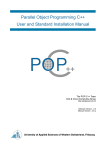
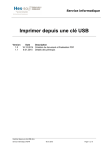
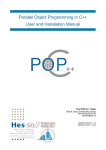
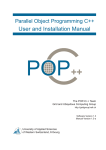
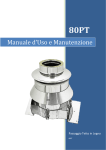


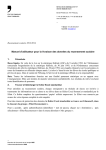
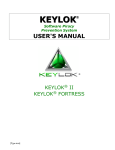
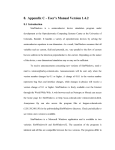
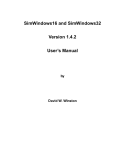

![j:j_"Xt$l"j:]:":,lg]:"r/Human Resources have been duty - e](http://vs1.manualzilla.com/store/data/005657435_1-26d97049bf04f0fd92265d73e45a9ab3-150x150.png)
